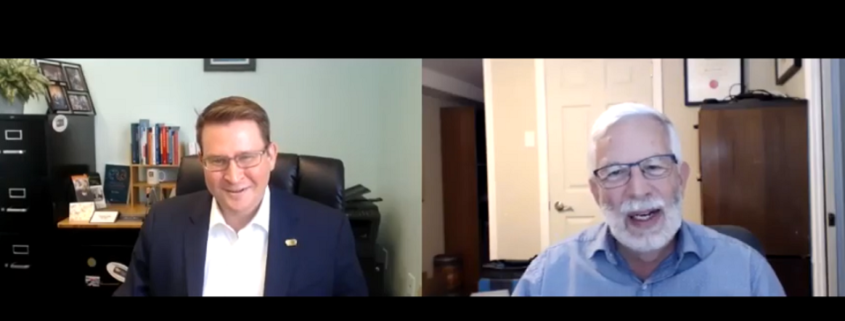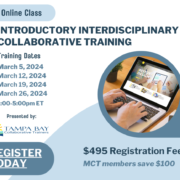Video: Cordover & Direnfeld on Clergy in Divorce
I recently had the honor of being interviewed by Gary Direnfeld of Ontario, Canada. Gary Direnfeld is an internationally renowned social worker and family advocate. He is a trainer, a friend, and a contributing author to the American Bar Association book I co-edited and co-authored with Forrest S. Mosten, Building A Successful Collaborative Family Law Practice (2018). You can find the video below.
Below you will find a transcript of the interview, lightly edited for clarity.
Gary Direnfeld (“Gary”): Okay, Gary Direnfeld here, and I’m with a dear colleague, Adam Cordover, from Tampa Florida.
Adam Cordover (“Adam”): Gary, great to see you!
Gary: I want our viewers to know that, first of all, I look at you I think, “He’s so young!” But I know how accomplished you are. I know that you’ve edited a book with Forrest “Woody” Mosten on Collaborative Family Law. I know that you are a major international presenter teaching people how to practice Collaborative Family Law. I know that you’re sitting on the board of the International Academy of Collaborative Professionals. So, all of that said, as I said he looked so young. How do you do it?
Adam: I have had a lot of great mentors!
Gary: So, I wanted to interview you. I came across your blog post today on “Should a Rabbi help you with your divorce?” What’s the name of your website so people can access it?
Adam: It is www.familydiplomacy.com.
Gary: Okay, so I came across your blog through Facebook. I do follow you because I like you and you had a blog today that was virtually about inviting the rabbi to the family Collaborative Practice meeting to, among other things, help sort out that parenting plan. Though we are Jewish, the whole world isn’t Jewish, and so it could be the rabbi. It could be the priest. It could be the imam. It could be a tribal elder, an indigenous elder. But I saw the blog about inviting this person to the collaborative table and I found it so impressive. You know people can read the blog, they can understand all of that. What I was curious about is this: how did you come to this idea?
Adam: Well, thank you, Gary, for asking. First of all, it is now in the High Holiday season in Judaism. Rosh Hashanah just passed, and Yom Kippur is coming up. I’m fortunate enough to know a
rabbi here in Tampa who’s with Chabad. His name is Mendy Dubrowski, and he has actually gone through an Introductory Interdisciplinary Collaborative Training after he and I had some discussions. The truth is that I’m a huge fan of the Collaborative Process. Historically, divorce has just dealt with legal issues. In the Collaborative Process, we get to deal with not only legal issues but also emotional issues and financial issues.
But what about other issues? What about issues related to our faith, our values, our traditions? Sometimes it may be helpful to go beyond the traditional Collaborative Divorce team, beyond just having a facilitator/mental health professional, a financial professional, and the attorneys. Perhaps we need to have somebody in the room who can help console us, help ensure that we are still abiding by our best faith and traditions, and also help us keep on best behavior as well during these difficult, difficult times. And, actually, as to that last part, Gary, I had seen you give a talk about bringing community leaders into into different processes. I certainly had that in mind when I was writing this.
Gary: I’m glad to have influenced you, but to go so far as to have a collaboratively trained faith leader, to me that’s amazing.
Adam: You know, a lot of times Collaborative Professionals ask, “Well, how can I speak with faith leaders about Collaborative Divorce?” And that can sometimes be very difficult. Maybe another option that worked with with this rabbi, although he was very receptive to it, is to ask the faith leaders, “What are the views of divorce from your tradition’s perspective?” Sometimes this question can open the door for faith leaders who might initially not be open to the discussion. It can help you reassure them that you are not seeking to promote divorce, but rather to help those families whose marriage are truly irretrievably broken. That you believe Collaborative Practice is a better way, and it is a method that can better protect the family’s values and traditions.
Of course, Rabbi Mendy was was fantastic and he’s good friend who was open to it. But I have found that this has also helped with with other faith leaders, and sometimes that’s just the type of individual that you need in a room when you’re going through very, very difficult discussions.
Gary: I totally get it. I once had a Lubavitcher rabbi. He was so big, so tall, with a big black hat and the beard. And where I was getting nowhere with a family, in five minutes he just looked at them and said, “Okay now, you’re gonna do this. You’re gonna do that.” And he he was the authority, and they followed his lead. In another circumstance, I’ve had reverence into the room. It was an indigenous elder. And to have those persons there, it shifts the whole feeling of what’s going on. And it does put people into their better selves. I loved reading that article. I have never seen anyone else approach that.
Adam: Well, thank you so much. Sometimes, it is also helpful to bring in a faith leader to help with the technical aspects of the divorce, depending on your faith. Because, as in Judaism, it may be that your faith does require a get to marry again. Or the payment of a mahr, in parts of the Islamic faith. Or perhaps you may want a religious annulment, to remarry within the Catholic tradition and perhaps other branches of Christianity. So there are many reasons why people should at least consider whether they want a rabbi or another faith leader to help them out as they’re going through these difficult times.
Gary: Well, Adam, you are brilliant even if you’re young! Maybe that is ageist, but you are brilliant. You are so flexible, and you demonstrate an out-of-the-box thinking that so enables meeting the needs of the people you serve. So hats off to you, my friend, and thank you for doing this interview!
Adam: Gary, thank you for for inviting me to discuss this topic. Thanks!
Adam B. Cordover is an international leader in Collaborative Family Law. He helps families in Hillsborough, Pinellas, Pasco, Sarasota, and Manatee counties, and throughout the State of Florida.





